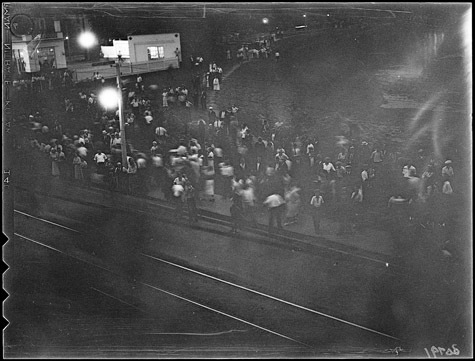Lilian Nattel's Blog, page 3
April 29, 2017
The Gentle-Hearted Computer Scammer
Sometimes I like to toy with the scammers on the phone. It’s an exercise in quick thinking, saying whatever comes into my head, messing with them until they hang up in an outraged huff. This time it was the Microsoft scam. You know, they call and say that they’re from Windows and they’ve detected errors on your computer. The conversation went like this.
Him: “I’m calling from Microsoft Windows, Ma’am. We’ve detected dangerous errors on your computer. Do you know that it’s under attack?”
Me: “But I don’t have any computers.”
He pauses, startled.
Him: “None at all?”
Me: “No, it’s against my religion.”
Him, with a laugh: “I’ve never heard of such a thing. What kind of religion is that?”
Me, calm and earnest: “You see, I’m not allowed to use anything invented since the 1950s. I can talk on the phone because that existed in the 1950s, or use a typewriter. But not a computer.”
Him: “But why? How can anyone live without a computer or a phone or anything?”
Me: “Look at the world around you. Do you think it’s that good? Or maybe it was better before.”
Him, quickly, excited: “You know, you’re right. I had a problem with being addicted to my phone! I was on it all the time and very late. It was terrible, and I tried hard to get control of it. I’m better with it now, but still, it’s not good.”
Me, sympathetically: “It can’t be much fun working in a call centre, calling people about their computers.”
Him: “No, no. It’s terrible, and I hate it, but I have to have a job.”
Me: “If you could do anything you wanted, anything else, what would it be?”
Him, eagerly: “I want to build things.”
Me: “Could you go to school for that?”
Him: “Oh, I did, Ma’am. I went to school to study engineering. I couldn’t get a job in it, but I applied to many places, and I hope I will soon.”
Me: “I hope you will, too. You’re a good man, and you should have a good job.”
Him, effusively: “Thank you, I really thank you. It was wonderful talking.”
Me, startled, embarrassed because I was messing around, and amazed, touched, grateful that somehow, in the midst of my bullshit and his deceitful script, there was a genuine connection, a meeting of hearts, “I’m sure that you can do it.”
Him: “Bless you, Ma’am.”
We wished each other a good day, and I hung up the phone.
The Oldest Woman’s Secret
The reporter sits across from me and asks very nicely if he can record our conversation. Video, he says. I know what video is, I tell him. My voice doesn’t sound like my voice. I’m 115 years old. I used to be the second oldest person in the world. Since February, I’ve been the oldest person still alive.
“1900 isn’t that long ago,” I tell him. “It’s still the twentieth century.”
“We’re in the 21st now,” he says kindly.
I could smack him for his kindness, if I had the energy. “I know that. I’ve still got my marbles.”
People want my secrets of a long life, like it’s something I invented. I was a laundress. If I had the brains to invent something, I wouldn’t have washed and ironed clothes for a living. “I was a laundress,” I tell him. “That was my first job. I did the laundry in one of those homes for unwed mothers. It was a good one. Not like the ones that you hear about that make the girls work in the laundry themselves, all heavy with the baby and breathing in steam.”
“How many children do you have?” he asks.
“Young man, didn’t you look that up on your thing. What’s it called, your moogle?” I’m teasing him. I know he’s got a mobile phone and you google it or you siri it or something.
“Let’s get right to the part you’re interested in,” I say. “I have sixty-two great-great grandchildren. There is one great-great-great, a wee baby. I’ve outlived two of my children, but the other three are still kicking. I’ve got no secrets of life to tell you. I’m a crabby old woman waiting to die in a nursing home. The only reason I’m in such a nice nursing home is that I’m the oldest woman in the world. Otherwise my children, and grandchildren, and great-great grandchildren would let me rot.”
I know that’s not true. They’re all good enough kids, but this young man is getting on my nerves. My vision isn’t what it used to be, and he looks all shadows and shapes to me, no face at all, but he talks down to me and that’s one thing I could never stand.
“What did you do after you became a laundress?” he asks. “I know I could look it up, but I just want to hear how you talk about your life in your own words.”
“I started working at fifteen,” I say. “It’s easy to calculate. So that was 1915. In 1930, with the crash, I lost my job and I scrabbled for a living. Then came the war.”
“The second world war,” he says.
“I would really be old if it was the first!” I snap. Then I decide to take another approach. “What about you?” I ask. “You tell me about yourself. If I like the story, I’ll tell you the secret of my long life.”
There’s no sound for a few minutes. Then he turns off the video. “You sure?”
“Yes,” I say.
“Ok. I’m from a small town in Montana. I have a younger sister. My father is dead, my mother is a waitress. I’ve been a journalist for three years, ever since I graduated. I have a lot of debt. I support myself by making online porn videos because journalism doesn’t pay. If you tell me a story that nobody else knows, maybe I can give it up.”
“Bullshit,” I say flatly. After a 115 years, I know it when I hear it.
He sighs. “I’m a runaway from an abusive family?”
January 30, 2017
Lessons in Resistance: The Swastika Riot
 The only photo of the riot at Christie Pits; courtesy Toronto Archives; fonds 1266
The only photo of the riot at Christie Pits; courtesy Toronto Archives; fonds 1266So it was 1933. A lot of people liked Hitler. He was a cool dude back then. Racial profiling was mainstream. Sterilizing people considered degenerate because they were mentally ill or developmentally delayed or an “inferior” race or just too much trouble was also popular…everywhere. Back then the Hitler salute wasn’t unusual anywhere in the English speaking world.
Here in Toronto the Good, white people (ie of British descent) were worried about the darkening of the city, by which they meant the influx of Jews and Italians. Residents of the nice (well-heeled, British) beaches area didn’t appreciate the working class immigrants who, escaping their hot tenements, came down to Lake Ontario to cool off. Near tennis courts and lawn bowling. (Good Heavens! The smell of garlic. The babies changing into dry clothes. Is there anything worse than a tiny naked foreigner?)
Signs on the beach and swimming pools indicated restrictions, No Jews or Italians, who were as good as. And though the local Swastika Club started off small, it was gaining members who wore their emblem, a white badge with a red swastika, as they strutted up and down the boardwalk. They weren’t expecting scrawny immigrants to fight back. There were clashes. Order and good government was shaken.
Toronto’s mayor, William Stewart, pleaded for restraint. His chief of police, Brigadier-General Draper, was unimpressed. They were both members of the Orange Order, an international Protestant brotherhood that marched through the city every year to let Catholics and others know who was boss.
(In the meantime, Pierre Van Paassen, a reporter for The Toronto Star, was writing daily about the atrocities against Jews in Germany; the day after the 1933 Orange Parade, 15,000 people marched in sympathy. Per capita, that’s as many as in the Women’s March in New York or LA.)
The summer of ’33 was hot, temperature as well as tempers.
Chief Draper and his militarized officers spent every weekend suppressing free speech in parks around the city. Wherever people were calling for work, decent wages, food for the hungry, his horses and men were there to pound them with batons and haul them off. He wasn’t interested in a softball game and a bunch of Jews.
So we come to Christie Pits, a park far from the beach. Around it was a British, working class enclave. Young men, out of work, joined gangs, who resented immigrants on the move, pushing into their territory from the east and south. One of the gangs, the Pit Boys, hooked up with the Swastika Club in the beaches, happy to exploit their resentment.
It was the height of the depression. Unemployment was high, and the softball games held at Christie Pits provided free entertainment attended by large crowds. The final series that year was between the Harbord Playground team, a group of Jewish boys, and St Peter’s.
There were rumblings. In the penultimate game, someone from the Pit Gang waved a sweater painted with a swastika. But they wanted to make a bigger statement, so during the night, they painted a giant swastika and “Hail Hitler” on the roof of the park’s club house. At the last game, tension mounted. The Pit Boys were sitting on the hill behind third base, the supporters of the Harbord team watching them from the opposite hill.
St. Peter’s won the game, but that wasn’t the point for the Pit Gang. They raised a large white blanket, the swastika painted large and black on it, called out Hail Hitler, and violence erupted. The Jewish boys, who’d snuck onto the hill above them, ran down, fists flying. The riot lasted six hours.
People poured from their houses and swarmed the streets. Jewish and Italian boys met up at the Golem restaurant and pool halls, grabbing cues and lead pipes. The riot spilled out of the park and into surrounding streets. The police were occupied elsewhere, busy arresting speakers in other parks. By the time they quelled the riot, it had run its course, involving up to ten thousand people. The blanket was trampled.
The mayor of Toronto, slight and unimposing and an Orange man who had no love for Catholics or Jews, could have done any number of things. His police chief would have loved a mass arrest. Instead the mayor banned the swastika.
It took a riot and a conservative mayor to make a statement about this city. A statement of action that changed the future of Toronto, which ultimately made my neighbourhood the haven that it is.
In 2017, from my house it’s a fifteen minute walk to Christie Pits or to Harbord Street, where my friends’ kids go to high school. The neighbourhood was gentrified decades ago. It’s peaceful and multicultural. The riot, its violence and the reasons for it, have become unimaginable…until recently.
But now Big Brother is in the Whitehouse, a pathological liar aiming to brainwash his people with repeated lies and propaganda.
Seen that one before, never wanted to see it again. But that is the reality we face, no alternative fact, and wherever we reside, we have to grapple with it.
As yet, Americans have avenues of communication and assembly open to them.
As yet, Canada is free and liberal, but the sickness is creeping up. We just saw a young, White Canadian Trump supporter shoot up Muslim families at prayer in Quebec. There ought to be horror and condemnation from both sides of the political aisle. We need to make common cause with everyone who reveres democracy and tolerance.
And be willing to fight.
In 1933, my grandparents were in Poland. Against all odds, I’m here.
Signs at the women’s march on Jan 21st: Community is the only cure for catastrophe. Action is the only antidote to anger.
It’s also the antidote to hopelessness.
The sequel to 1933’s riot a few blocks from my house? I just found it in the newspaper archives. 
November 15, 2016
At A Snail’s Pace Recovering

(click to enlarge)
In a dried out leaf, juicelessly veined,a snail snuggles. I envy the snail. Wordlessness is its normal condition, nothing to struggle with. It has a single sliding foot and a thousand microscopic teeth embedded in its tongue. Its sheltering leaf is on a plant that grew alongside the cracking cement of my walkway, the walkway of a 110 year old house. The snail won’t live long out here, but longer than I’d guessed. Three years maybe. In captivity it can live 15. Is it worth it?
March 21, 2016
When I Hired Trump: mini-fiction
 It’s a prejudice I have about dogs. They’re just not as smart as cats. Dogs are trained; cats do the training.
It’s a prejudice I have about dogs. They’re just not as smart as cats. Dogs are trained; cats do the training.
I have an infallible way of judging people. I peer at them over my reading glasses, tap their resumes, and ask myself: What do I see here? Cat or dog.
If the answer is cat, there’s no job for them here. This office has room for just one cat and that’s me. They call me the Terror, all those dogs I’ve hired, and quite rightly so. If they cross me, or even look crossways at me, the claws come out. The only way to run a business is Trump style.
So imagine my surprise when, after his disastrous showing in the election and his subsequent bankruptcy, he applied for a job here.
I looked at him over my glasses and saw, no surprise, a cat. Smug, self-absorbed, pampered. I broke my own rules to hire him. It was my own feline curiosity getting the better of me.
You might be interested to hear that Trump wasn’t actually that bad an employee. Yes, he arrived late. It’s true that many of our customers (especially Mexicans and Muslims) refused to deal with him. But he brought in new business, and I don’t have any reason to think a White Supremacist’s dollar isn’t as good as anyone else’s.
No, the main problem for me was Trump’s smell. The combination of hair dye and hair products to maintain his unique hair was, to a snesitive nose like mine, noxious.
“Trump,” I said, “the hair’s got to go. Also the orange tan. It gives me a headache.”
Now if he was a dog, he’d have immediately obeyed. But as a cat, he just preened and ignored me because, as he said, more than any other employee, he had a lot of words. The best words.
While I was talking to him, one of my guys comes into my office, red-faced and choking as he sputters “w–” because Trump locked up “wall” in his filing cabinet. Try writing copy for the condo developer without it. Just try. There were other good words in there, like “birth certificate”, “flirted”, “rich” and “global warming.” So I demanded the key, he resisted, there was fur flying, I can tell you.
But I’m not called the Terror for nothing. This is the moment I’d been waiting for. “You’re fired!” I said. Now he can tweet himself.
March 16, 2016
Found Art
It’s been raining all week, but I managed to go for a walk during a dry interlude. I saw this through the extended lens of my point and shoot, a tree ready for spring with its bobbles under a fertile sky.
Now back to work. It’s 1943 in southern Russia.
March 13, 2016
The Irony of Time and Trains
I grew up in Cote St. Luc, a Montreal neighbourhood surrounded on three sides by train tracks. I remember swinging in a small park at the end of my street, counting the train cars and singing their labels to the

(click to enlarge)
rhythm of their clickety-clack.
(The first trains in England provoked anxiety due to their speed. Running at the unbelievable rate of 30 mph, they were thought to potentially damage the human body, which wasn’t built for that speed, obviously!)
The whistle of a train evokes something eerie, the ghosts of its travellers and legends of stopped time.
Trains always meant travel to me, more so than planes. I saved babysitting money for four years for a plane trip, but travelling by train was immediate and visible at ground level, easy escape to somewhere else. When I was fifteen, I went by train to Kenora where all the teens in my youth group met, travelling by train from the east and the west of Canada. Later, when I went to university, I saw my mother recede, small in the background, as I left home for good.
My parents had different associations with trains, more to do with cattle cars and concentration camps which they had experienced in their early teens. It only occurred to me as an adult how strange it was that this train-encircled area had developed postwar as a Jewish enclave. There must have been a lot of young parents sufficiently motivated by the affordable cost of housing to put up with being freaked out by the sound of trains.
And here I am, strangely, in love with trains and, being a writer of historical fiction, with time, which itself owes a debt to trains. Standardized time, on my mind as I lost an hour of sleep this weekend switching over to DST, was a consequence of train travel. Before the railroad, every town had its own time and its own clock. People travelled slower then, more individually by coach or cart or foot, and goods travelled by boat, their destinations limited by sea and river. But coordinating trains requires schedules, and Sir Sanford Fleming, a Canadian engineer proposed standardized time zones. In 1851, he designed the three penny beaver, Canada’s first postage stamp.
Now, I live a block from railroad tracks. Just far enough so that my house doesn’t shake (unless there’s an unusually heavy load), and close enough to hear the whistle. I still go to the end of my street to watch them. I’ve been known to wave to the conductor. They’ve been known to wave back.
March 11, 2016
Found Art
March 9, 2016
One Teen, No Wifi: mini-fiction
 You have to be tactful when talking to teenagers. I am not a tactful person. That’s why I declined to take my sister’s son for the fall term while she went gallivanting in Africa. That didn’t stop him from showing up at my door with two suitcases, earbuds, and a pair of over-active thumbs.
You have to be tactful when talking to teenagers. I am not a tactful person. That’s why I declined to take my sister’s son for the fall term while she went gallivanting in Africa. That didn’t stop him from showing up at my door with two suitcases, earbuds, and a pair of over-active thumbs.
“What’s the problem with your wifi?” he asked me.
“Hello,” I said.
“I’m not getting anything,” he said. He was still standing on the threshold punching his phone screen with his thumbs.
“Come in,” I said. “I’ve got supper on the table. Do you like spaghetti?”
I was being as polite as I know how. Jeremy, my nephew, has been a brat since he turned ten years old, but I believe in letting the past go and living in the present, so I was still smiling.
He came in. I made him go out again to collect his suitcases and carry them upstairs to the guest room. Guest is what my sister calls it. It’s really an overflow room for my extra books. He’d have plenty of diverse reading material. When my sister called me from the airport, she left me very little time to clear the bed, but I managed to create stacks of books as a kind of footboard.
When he came down into the kitchen, I was already eating, a book in my hand. I was willing to offer him some help in choosing one for himself, but before I could do so, we got into the same conversation regarding wifi.
“I don’t have any,” I said.
“Is that possible? Do they still sell modems without wifi?”
“I don’t have internet.”
“What?”
“No internet.” I said it slowly.
“Why not?”
“I don’t need it.”
“Everybody needs it.”
“Not me. It makes me faint.”
He sat down heavily as if sentenced to prison, but that isn’t quite right because I think that they do get wifi in prison, though I imagine it would have to be censored wouldn’t it? Anyway I can’t google it, so I’ll live without that factoid. “What do you mean Aunt Gladdie?”
“Gladys,” I said. “Just call me Gladys. You’re old enough.”
He’s sixteen, which is the age of consent here, and if he could consent to sex, then he could call me by my proper name. I never thought of myself as the auntie type and neither did my sister. She is twenty years younger than me, and a very busy woman. Practically another Albert Schweitzer, so when she got pregnant, I assumed she’d have an abortion. She has no time to be a mother. And that’s why, periodically, Jeremy gets dumped on me, and we just have to put up with each other.
“You had internet,” he said.
“Yes.”
“But you don’t now.”
“Yes.”
“Are you sure it’s not in your head?”
I didn’t deign to reply. Why am I expected to be a diplomat but not him? I think children have too few expectations put on them these days. My sister was a brat, and her son is brattier. At least he wasn’t throwing the spaghetti the way he did when he was younger.
“This isn’t going to work, Aunt Gladdie,” he said. “I am going to have to stay with a friend.”
“Feel free,” I said. Wrong response, I know. My sister would have a fit. Diplomacy, compromise, understanding, talking things out—that’s how she would handle it. That’s why she runs away to Africa when she gets fed up.
“I will!” He pushed back his chair and stalked away, with, I noticed, a full plate of spaghetti in his hand.
“Don’t get any on the books!” I called after him.
“Like I’ll touch them,” he said as he stormed out.
He knows, after all these years, that I won’t run after him. I keep sitting at the table, finish my meal and dessert, a freshly baked apple pie, which, since he hasn’t stayed, leaves me more for myself. The remainder I wrap up to take to my neighbour who never gets out, along with a book, which I leave on his porch.
February 16, 2016
Found Art
Lilian Nattel's Blog
- Lilian Nattel's profile
- 133 followers










